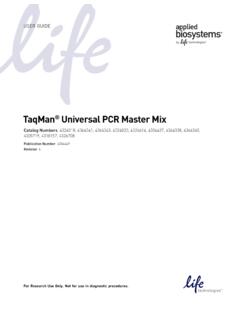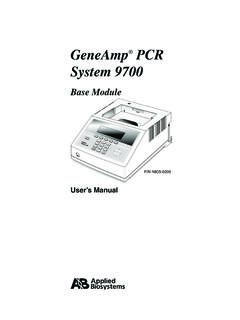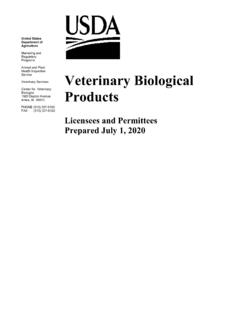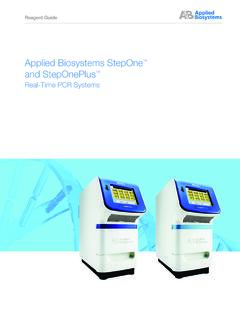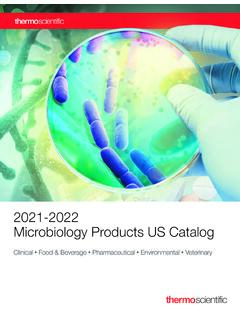Transcription of Novel Coronavirus (SARS-CoV-2) Real-Time Multiplex RT-PCR …
1 Revision No.: ZJ0004 Issue Date: April 9, 2020 Novel Coronavirus (SARS-CoV-2) Real-Time Multiplex RT-PCR Kit Instructions For Use For Emergency Use Only For In Vitro Diagnostic Use Only RR-0485-02 Shanghai ZJ Bio-Tech Co., Ltd. ( Tel: +86-21-34680598 Fax: +86-21-34680595 Building #26, 588 Xinjunhuan Road Shanghai 201114, China Liferiver 1 Table of Contents Intended Use .. 2 Summary and Explanation .. 2 Principles of the 2 Materials Required (Provided) .. 4 Materials Required (Not Provided) .. 4 Warnings and Precautions .. 5 Reagent Storage, Handling, and Stability .. 6 Specimen Collection, Handling, and Storage .. 6 General Preparation .. 7 Nucleic Acid Extraction .. 7 Assay Setup .. 7 Create and Run an Experiment on applied biosystems 7500 or 7500 Fast Real-Time PCR Instrument.)
2 9 Interpretation of Results and Reporting .. 16 SARS-CoV-2 Real-Time Multiplex RT-PCR Results Interpretation Guide .. 17 Quality Control .. 18 Limitations .. 18 Performance Characteristics .. 19 Disposal .. 29 References .. 29 Contact Information, Ordering, and Product Support .. 30 Liferiver 2 Intended Use The Novel Coronavirus (SARS-CoV-2) Real-Time Multiplex RT-PCR Kit is an in vitro diagnostic test for the presumptive qualitative detection of nucleic acid from the SARS-CoV-2 in upper and lower respiratory specimens (including nasopharyngeal or oropharyngeal swabs and sputum) collected from individuals as recommended for testing by public health authority guidelines. Results are for the presumptive identification of SARS-CoV-2 RNA. The SARS-CoV-2 RNA is generally detectable in upper and lower respiratory specimens during infection.
3 Positive results are indicative of active infection with SARS-CoV-2 but do not rule out bacterial infection or co-infection with other viruses. The agent detected may not be the definite cause of disease. Positive results should be reported in accordance with local regulations. Negative results do not preclude SARS-CoV-2 infection and should not be used as the sole basis for treatment or other patient management decisions. Negative results must be combined with clinical observations, patient history, and epidemiological information. Testing with Novel Coronavirus (SARS-CoV-2) Real-Time Multiplex RT-PCR Kit is intended for use in CLIA certified high-complexity laboratories or similarly qualified non-US laboratories by trained laboratory personnel who are proficient in performing Real-Time RT-PCR assays. Summary and Explanation On January 11, 2020, Chinese health authorities preliminarily identified more than 40 human infections with a Novel Coronavirus in an outbreak of pneumonia under investigation in Wuhan City, Hubei Province, China.
4 The Chinese authorities identified a new type of Coronavirus ( Novel Coronavirus , named as SARS-CoV-2), which was isolated on January 7, 2020. By February 25, 2020, SARS-CoV-2 has resulted in more than 80,000 confirmed human infections in a number of countries globally, including close to 2,700 deaths. The Novel Coronavirus (SARS-CoV-2) Real-Time Multiplex RT-PCR Kit is a molecular in vitro diagnostic test that aids in the detection and diagnosis of SARS-CoV-2 and is based on widely used real time RT-PCR technology utilizing reverse-transcriptase (RT) reaction to convert RNA into complementary DNA (cDNA) and nucleic acid amplification technology. The product contains Super Mix, RT-PCR Enzyme Mix and control material used in rRT-PCR for the in vitro qualitative detection of SARS-CoV-2 RNA in respiratory specimens. Principles of the Procedure Three sets of oligonucleotide primers and probes for detection of SARS-CoV-2 were selected respectively from regions of the virus ORF1ab gene, N gene and E gene.
5 An additional primer/probe set to detect the internal control gene processed with the clinical specimens is also included in the kit. RNA isolated and purified from upper and lower respiratory specimens is reverse transcribed to cDNA and subsequently amplified in the Real-Time PCR instrument. In the process, the probe anneals to a specific target sequence located between the forward and reverse primers. During the extension phase of the PCR cycle, the 5 nuclease activity of Taq polymerase degrades the probe, causing the reporter dye to separate from the quencher dye, generating a fluorescent signal. With each cycle, additional reporter dye molecules are cleaved from their respective probes, increasing the fluorescence intensity. Fluorescence intensity is monitored at each PCR cycle by Real-Time PCR system . Liferiver 3 Upon receipt of rRT-PCR Kit reagents All reagents stored at -20 5 C Upon obtaining sample Extract sample RNA and Negative Control Prepare Master Mix (20 L) Add rRT-PCR template (5 L RNA) Run assay on ABI 7500 Analyze data Report results Detection of viral RNA not only aids in the diagnosis of illness but also provides epidemiological and surveillance information.
6 Summary of Preparation and Testing Process Liferiver 4 Materials Required (Provided) RR-0485-02 Ref. Type of Reagent Quantity Sufficient for 25 Rxns 1 SARS-CoV-2 Super Mix 1 vial, 513 L 2 RT-PCR Enzyme Mix 1 vial, 27 L 3 SARS-CoV-2 Internal Control 1 vial, 30 L 4 SARS-CoV-2 Negative Control 1 vial, 400 L 5 SARS-CoV-2 Positive Control 1 vial, 30 L Control materials SARS-CoV-2 Negative Control is DEPC-water that will serve as an external negative specimen during RNA extraction procedure. SARS-CoV-2 Positive Control is a mixture of plasmids containing partial ORF1ab gene, N gene and E gene RNA fragment which are designed to cover the target sequence respectively to react with the real time RT-PCR reagents in this kit to indicate whether the real time RT-PCR worked. Internal Control (IC) is a plasmid containing non-target RNA fragment that will be added into the specimen before RNA extraction procedure to evaluate RNA extraction efficiency and identify possible PCR inhibitors.
7 The RNA fragment in plasmid will be amplified and detected by another set of primer and probe. Materials Required (Not Provided) RNA Extraction Options Instrument Manufacturer Extraction Kit Catalog No. QIAGEN QIAamp Viral RNA Mini Kit 52904/52906 Equipment and Consumables Required (Not Provided) Vortexmixer (Qinlinbeier; catalog # VORTEX-5) or equivalent Microcentrifuge Desk top centrifuge with a rotor for 2ml reaction tubes (Eppendorf ; catalog #5415C ) or equivalent Micropipettes (disposable) Multichannel micropipettes (disposable) Racks for mL microcentrifuge tubes 2 x 96-well -20 C cold-blocks 7500 Real-Time PCR Systems with SDS software ( applied biosystems ; catalog #4351104 or #4351105) or 7500 Fast Real-Time PCR Systems with SDS software ( applied biosystems ; catalog #4351106 or #4351107) Molecular grade water, nuclease-free 10% bleach (1:10 dilution of commercial hypochlorite bleach) DNAZapTM (Ambion, cat.)
8 #AM9890) or equivalent RNAse AwayTM (Fisher Scientific; cat. #21-236-21) or equivalent Disposable powder-free gloves and surgical gowns Liferiver 5 Aerosol barrier pipette tips mL microcentrifuge tubes (Axygen; catalog #MCT-150-C) or equivalent 8-strip tubes (Axygen; catalog #PCR-0208-C) or equivalent 8-strip caps (Axygen; catalog #PCR-2CP-RT-C) or equivalent Warnings and Precautions For in vitro diagnostic use (IVD). For emergency use only. Follow standard precautions. All patient specimens and positive controls should be considered potentially infectious and handled accordingly. Do not eat, drink, smoke, apply cosmetics or handle contact lenses in areas where reagents and human specimens are handled. Handle all specimens as if infectious using safe laboratory procedures. Refer to Interim Laboratory Biosafety Guidelines for Handling and Processing Specimens Associated with SARS-CoV-2 Specimen processing should be performed in accordance with national biological safety regulations.
9 If infection with SARS-CoV-2 is suspected based on current clinical and epidemiological screening criteria recommended by public health authorities, specimens should be collected with appropriate infection control precautions. Due to the relatively fast molecular revolution of RNA viruses, there is an inherent risk for any RT-PCR based test system that accumulation of mutations over time may lead to false negative results. Perform all manipulations of live virus samples within a Class II (or higher) biological safety cabinet (BSC). Use personal protective equipment such as (but not limited to) gloves, eye protection, and lab coats when handling kit reagents while performing this assay and handling materials including samples, reagents, pipettes, and other equipment and reagents. Amplification technologies such as PCR are sensitive to accidental introduction of PCR product from previous amplifications reactions.
10 Incorrect results could occur if either the clinical specimen or the Real-Time reagents used in the amplification step become contaminated by accidental introduction of amplification product (amplicon). Workflow in the laboratory should proceed in a unidirectional manner. Maintain separate areas for assay setup and handling of nucleic acids. Always check the expiration date prior to use. Do not use expired reagent. Do not substitute or mix reagent from different kit lots or from other manufacturers. Change aerosol barrier pipette tips between all manual liquid transfers. During preparation of samples, compliance with good laboratory techniques is essential to minimize the risk of cross-contamination between samples, and the inadvertent introduction of nucleases into samples during and after the extraction procedure. Proper aseptic technique should always be used when working with nucleic acids.










